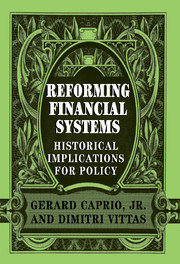Book contents
- Frontmatter
- Contents
- List of contributors
- Foreword
- 1 Financial history: Lessons of the past for reformers of the present
- 2 The evolution of central banking
- 3 Free banking: The Scottish experience as a model for emerging economies
- 4 Regulation and bank stability: Canada and the United States, 1870–1980
- 5 Deposit insurance
- 6 Contingent liability in banking: Useful policy for developing countries?
- 7 Universal banking and the financing of industrial development
- 8 Before main banks: A selective historical overview of Japan's prewar financial system
- 9 Thrift deposit institutions in Europe and the United States
- 10 The development of industrial pensions in the United States during the twentieth century
- 11 The rise of securities markets: What can government do?
- Index
10 - The development of industrial pensions in the United States during the twentieth century
Published online by Cambridge University Press: 25 March 2010
- Frontmatter
- Contents
- List of contributors
- Foreword
- 1 Financial history: Lessons of the past for reformers of the present
- 2 The evolution of central banking
- 3 Free banking: The Scottish experience as a model for emerging economies
- 4 Regulation and bank stability: Canada and the United States, 1870–1980
- 5 Deposit insurance
- 6 Contingent liability in banking: Useful policy for developing countries?
- 7 Universal banking and the financing of industrial development
- 8 Before main banks: A selective historical overview of Japan's prewar financial system
- 9 Thrift deposit institutions in Europe and the United States
- 10 The development of industrial pensions in the United States during the twentieth century
- 11 The rise of securities markets: What can government do?
- Index
Summary
Pensions are retirement insurance – they offer protection in case you live long enough to quit collecting a paycheck and are able to head for the links and beaches in Florida. In the United States, pensions are provided by both the public and the private sectors. Private sector pensions are the largest formal financial institution for life-cycle saving, with assets measuring in the trillions of dollars.
Societies have always had to take care of their dependent elderly and disabled. Historically, the United States has honored some of its retired citizens with generous pensions, from Civil War veterans to today's corporate executives. Others have been more or less ignored, and they have fared poorly. Since the turn of the century, occupational pensions have been important providers of retirement insurance.
Creating pensions
In the historical development of pensions, several economic and social issues arose concerning employees, employers, and the general economy. These issues relate to three questions: What do employees want from pensions? What incentives does the employer have to create pensions? What are the desirable effects of company pensions for the general economy?
Employees primarily wanted retirement insurance. If they felt that company pensions provided a better and safer return on life-cycle savings, they would prefer that pensions be provided by employers. In addition, workers did not want to lose their pensions if they left the firm before reaching retirement age. Thus, they wanted pensions that were vested and portable.
Vesting means that after working for an employer for a certain number of years, your pension is guaranteed even if you leave the firm.
- Type
- Chapter
- Information
- Reforming Financial SystemsHistorical Implications for Policy, pp. 180 - 197Publisher: Cambridge University PressPrint publication year: 1997



